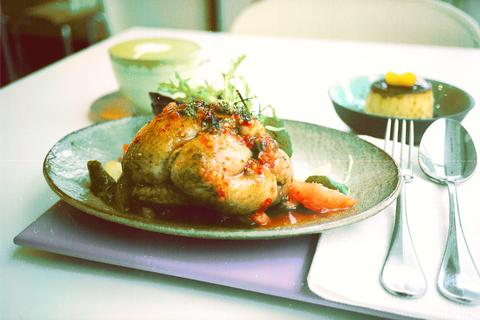Wasabi may be a fashionable hangout for Taipei's fashion and entertainment circles, but it also manages to maintain a reasonably comfortable atmosphere and serve good food.
The restaurant was opened a year and two months ago by Chen Chao-wen (

PHOTO: DAVID FRAZIER, TAIPEI TIMES
Since leaving the music industry, Chen has gone into business with Chang on a skate shop in Tienmu, Kream, and tossed around ideas of creating various types of magazines or brands. He sees Wasabi, his first restaurant, as another step in this ever-evolving chain. His goal for the place was to make a sort of stylish lunchroom cafe with an international menu, a never-ending supply of good music and all the latest magazines to read.
That said, he's pretty much done it. The design concept is sort of white box (not unlike that of the cafe, 2.31), but the motif isn't so severe that the space becomes antiseptic or uncomfortable. Ceiling-length glass windows at the front also create the kind of fishbowl effect, but fortunately not to such a ridiculously narcissistic degree as in "be seen" bars like Tickle My Fantasy.
The restaurant is located just south of the park on Yungkang St., an area already dense with some of Taipei's best dining. Wasabi's menu is concise, filling only one tall folding card, but includes a fair variety and tends toward the gourmet.
It is anchored around curries, like the mango curry chicken (NT$280), which like Japanese-style curries is breaded, deep fried and served with rice under a thick yellow-orange curry sauce. Pasta dishes run around NT$300 to NT$350. Topping the menu in terms of price, there is a hodgepodge of hybrid international recipes, including German honey-mustard pigs' feet (NT$420), steak filets, lamb dishes and Thai-style roasted French spring chicken (NT$550). Portions tend to be a little bigger than average, which means they are filling. Also, certain entrees are rotated every two months.
For those wishing to use Wasabi as a cafe -- and many do -- the drink menu lacks little. Coffee drinks and teas are served in glass teacups, and the drink menu offers a few gems like macha milk tea (NT$150), which is made from frothy Japanese green tea.
As Chen is an aficionado of the grape, there is also a small but respectable list of wines and champagnes that run from NT$1200 to NT$2800 a bottle. An eclectic array of beers (the most easily identifiable being the Belgian brew Delerium Tremens) are priced between NT$200 and NT$400.

In the March 9 edition of the Taipei Times a piece by Ninon Godefroy ran with the headine “The quiet, gentle rhythm of Taiwan.” It started with the line “Taiwan is a small, humble place. There is no Eiffel Tower, no pyramids — no singular attraction that draws the world’s attention.” I laughed out loud at that. This was out of no disrespect for the author or the piece, which made some interesting analogies and good points about how both Din Tai Fung’s and Taiwan Semiconductor Manufacturing Co’s (TSMC, 台積電) meticulous attention to detail and quality are not quite up to

April 21 to April 27 Hsieh Er’s (謝娥) political fortunes were rising fast after she got out of jail and joined the Chinese Nationalist Party (KMT) in December 1945. Not only did she hold key positions in various committees, she was elected the only woman on the Taipei City Council and headed to Nanjing in 1946 as the sole Taiwanese female representative to the National Constituent Assembly. With the support of first lady Soong May-ling (宋美齡), she started the Taipei Women’s Association and Taiwan Provincial Women’s Association, where she

Chinese Nationalist Party (KMT) Chairman Eric Chu (朱立倫) hatched a bold plan to charge forward and seize the initiative when he held a protest in front of the Taipei City Prosecutors’ Office. Though risky, because illegal, its success would help tackle at least six problems facing both himself and the KMT. What he did not see coming was Taipei Mayor Chiang Wan-an (將萬安) tripping him up out of the gate. In spite of Chu being the most consequential and successful KMT chairman since the early 2010s — arguably saving the party from financial ruin and restoring its electoral viability —

It is one of the more remarkable facts of Taiwan history that it was never occupied or claimed by any of the numerous kingdoms of southern China — Han or otherwise — that lay just across the water from it. None of their brilliant ministers ever discovered that Taiwan was a “core interest” of the state whose annexation was “inevitable.” As Paul Kua notes in an excellent monograph laying out how the Portuguese gave Taiwan the name “Formosa,” the first Europeans to express an interest in occupying Taiwan were the Spanish. Tonio Andrade in his seminal work, How Taiwan Became Chinese,